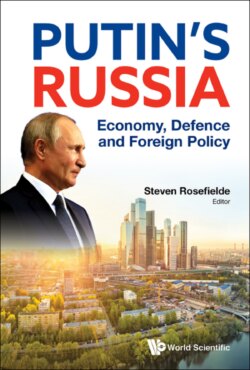Читать книгу Putin's Russia - Группа авторов - Страница 11
На сайте Литреса книга снята с продажи.
Costs of Private Sector Anti-Competitiveness
ОглавлениеPutin pays a price for the benefits the Kremlin reaps from Russia’s Muscovite market system. The economy is inefficient and underproductive. The autocrat could improve the system’s performance by eliminating anti-competitive aspects that do not serve his purposes. He could streamline rent-granting, curb superfluous anti-competitiveness and improve the climate for entrepreneurship and direct foreign investment. This would enhance the efficiency of factor allocation, enabling at least one producer to increase output without incurring diminished production elsewhere, while making factor prices more consonant with competitive marginal factor productivities. Increased competitiveness would also shift production towards an equilibrium more closely attuned to consumer demand, within limits fixed by Putin’s priorities, and the productivity of the whole system would increase through improved entrepreneurship, indigenous technological progress, technology transfer and diffusion. These gains in their entirety would be “Pareto” superior; that is, they would make consumers better off, simultaneously advancing one of Putin’s political goals, without entailing losses in other aspects of his agenda.
The competitive principles guiding this line of reasoning assume that workers can freely negotiate terms of employment and the quality of the work environment and are able to insure themselves against layoffs, dismissals and medical exigencies. Insofar as Russia violates these assumptions, room exists for improving the risk insurance aspect of worker well-being on a “Pareto” superior basis. Both workers and Putin could enjoy improved economic security without sacrificing any other benefits. These gains would be invisible in national income statistics because implicit insurance transfers are not included in GDP.
